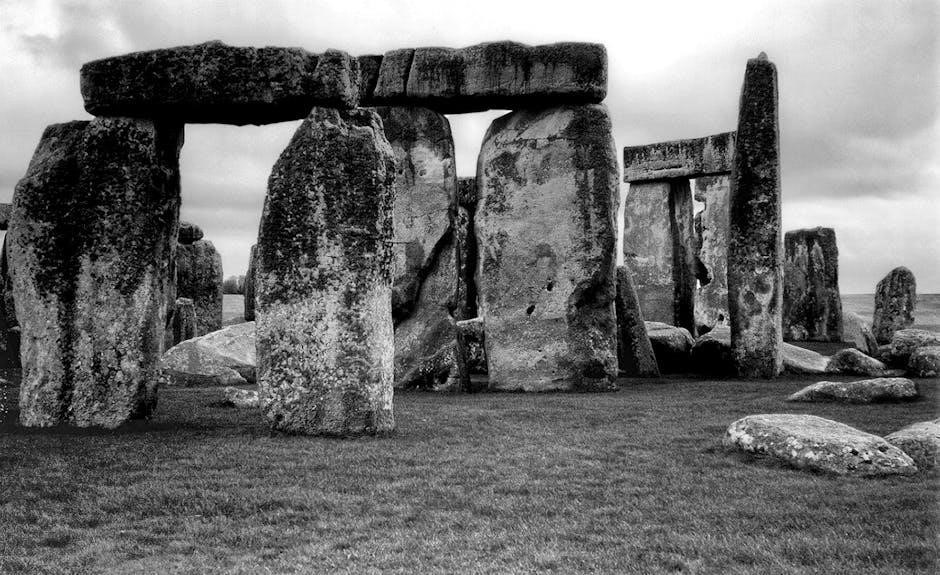
hard boiled wonderland and the end of the world pdf
Hard-Boiled Wonderland and the End of the World is a surreal, genre-blending novel by Haruki Murakami, exploring identity, technology, and the subconscious through interconnected narratives.
Overview of the Novel
Hard-Boiled Wonderland and the End of the World is a complex, surreal novel that intertwines two distinct narratives, blending elements of science fiction, fantasy, and detective fiction. The story alternates between the “Hard-Boiled Wonderland” and “The End of the World,” creating a dual structure that explores themes of identity, technology, and the subconscious. In one narrative, a nameless protagonist navigates a bizarre, futuristic world filled with strange creatures and technologies, while the other follows a man in a quiet, isolated town at the “end of the world.” The novel delves into existential questions, examining how individuals confront their identities and the impact of technology on humanity. Murakami’s unique writing style weaves these narratives together, offering a profound exploration of human experience.
Author Background: Haruki Murakami
Haruki Murakami is a renowned Japanese author born on January 12, 1949, in Kyoto, Japan. Known for his unique blend of magical realism, surrealism, and philosophical insights, Murakami’s works often explore themes of identity, alienation, and the human condition. His writing style, which combines elements of Western literature with Japanese culture, has gained global acclaim. Murakami’s career began in 1979 with the novel Norwegian Wood, but it was Hard-Boiled Wonderland and the End of the World that solidified his reputation as a literary innovator. He has since written numerous bestsellers, including The Wind-Up Bird Chronicle and Kafka on the Shore. Murakami is also a skilled translator and has a deep passion for music and running, which often inspire his creative process.
Publication and Reception
Hard-Boiled Wonderland and the End of the World was first published in 1985 and quickly gained recognition for its unique narrative style and philosophical depth. The novel earned Haruki Murakami the prestigious Tanizaki Prize in the same year, solidifying his reputation as a literary innovator. The English translation, by Alfred Birnbaum, followed in 1991, introducing the book to a global audience. Critics and readers alike praised its imaginative storytelling, blending of genres, and exploration of identity and technology. The novel’s surreal and thought-provoking nature has made it a standout work in Murakami’s oeuvre, appealing to a wide range of readers and cementing its place as a modern literary classic.
Structure and Narrative Style
Hard-Boiled Wonderland and the End of the World features a dual narrative structure, blending science fiction and detective genres with a unique, surreal writing style that captivates readers.
Dual Narrative Structure
Hard-Boiled Wonderland and the End of the World employs a dual narrative structure, alternating between two distinct yet interconnected storylines. The “Hard-Boiled Wonderland” sections immerse readers in a surreal, sci-fi-infused detective narrative, while “The End of the World” unfolds as a haunting, almost fairy-tale-like account of a man’s journey in a mysterious town. These parallel narratives gradually converge, revealing shared themes of identity, memory, and the subconscious. The alternating chapters create a sense of rhythm, drawing readers into a world where reality and fantasy blur. This structure not only enhances the novel’s complexity but also underscores its exploration of duality, leaving readers to piece together the connections between the two seemingly disparate worlds.
Blending of Genres

Hard-Boiled Wonderland and the End of the World masterfully blends genres, combining elements of detective fiction, science fiction, and fantasy. The novel’s unique fusion creates a surreal and immersive experience, drawing readers into a world where the boundaries between reality and fantasy blur. Murakami seamlessly integrates philosophical musings, psychological depth, and speculative elements, making the story both intellectually stimulating and emotionally engaging. This genre-blending approach allows the novel to explore complex themes like identity, technology, and the subconscious while maintaining a narrative that is both accessible and thought-provoking. The result is a work that defies easy categorization, offering readers a rich and multifaceted literary experience.
Unique Writing Style

Haruki Murakami’s Hard-Boiled Wonderland and the End of the World showcases a unique writing style that captivates readers with its surreal and imaginative storytelling. Murakami’s prose is both concise and evocative, blending philosophical musings with a dreamlike atmosphere. His ability to weave together vivid imagery, metaphysical concepts, and everyday details creates a narrative that feels both grounded and otherworldly. The novel’s language is simple yet profound, allowing readers to connect with its complex themes on a deeper level. Murakami’s distinctive voice, marked by its calm yet introspective tone, adds to the novel’s enigmatic charm, making it a standout work in contemporary literature. This style has been praised for its originality and emotional resonance.

Major Themes in the Novel
Hard-Boiled Wonderland and the End of the World explores identity, technology’s impact on humanity, and the interplay between the subconscious and conscious mind, weaving these themes seamlessly into its narrative.
Identity and Self-Discovery
Identity and self-discovery are central themes in Hard-Boiled Wonderland and the End of the World. The protagonist, a nameless narrator, navigates a fragmented world, symbolizing the search for self. His journey reflects the tension between external influences and inner truth, as societal expectations and technological forces shape his identity. Through surreal experiences, Murakami explores how individuals construct and deconstruct their selves, highlighting the fluidity of identity. The novel suggests that true self-discovery lies in embracing the duality of existence, where the conscious and subconscious coexist. This theme resonates deeply, inviting readers to reflect on their own journeys of self-exploration and understanding.
Technology and Its Impact on Humanity
Technology and Its Impact on Humanity is a significant theme in Hard-Boiled Wonderland and the End of the World. The novel portrays technology as both a tool of progress and a force that alienates individuals from their humanity. The protagonist’s experiences in a technologically driven world highlight the tension between innovation and emotional connection. Murakami explores how technology can manipulate identity and memory, raising questions about its influence on human existence. The narrative critiques the over-reliance on technology, suggesting it may lead to a loss of authenticity and deeper human understanding. This theme serves as a cautionary reflection on the role of technology in shaping modern life and its potential to isolate individuals from their true selves.
The Subconscious vs. the Conscious Mind
The Subconscious vs. the Conscious Mind is a central theme in Hard-Boiled Wonderland and the End of the World. The novel delves into the interplay between these two realms, often blurring the lines between reality and fantasy. The protagonist’s journey through a surreal world symbolizes the struggle to reconcile the conscious mind with the subconscious, where memories, desires, and fears reside. Murakami uses the dual narrative structure to explore this duality, with one storyline representing the conscious, logical world and the other embodying the subconscious, emotional realm. The well, a recurring symbol, serves as a gateway to the subconscious, highlighting the protagonist’s internal conflict and the universal human quest for self-understanding and integration.

Key Characters and Their Roles
The Protagonist embodies an identity crisis, navigating surreal worlds. The Girl symbolizes connection, guiding him through emotional landscapes. The Librarian guards knowledge, aiding his quest for self-discovery.
The Protagonist: A Symbol of Identity Crisis
The unnamed protagonist of Hard-Boiled Wonderland and the End of the World serves as a symbol of identity crisis, navigating two distinct worlds that reflect his fragmented self. His journey through a surreal, dreamlike landscape and a dystopian reality underscores his struggle to reconcile his dual existence. The protagonist’s namelessness emphasizes his lack of a defined identity, while his experiences symbolize the universal search for self and meaning. Through his interactions with other characters, such as the Girl and the Librarian, he grapples with questions of memory, consciousness, and the impact of technology on humanity. His story becomes a metaphor for the modern individual’s quest to find balance in a chaotic world.
The Girl: A Representation of Connection
The Girl in Hard-Boiled Wonderland and the End of the World embodies the theme of connection, serving as a bridge between the protagonist’s fragmented worlds. Her presence in the narrative symbolizes the possibility of human bonding in a surreal, disjointed reality. Through her interactions with the protagonist, she represents the idea of emotional and psychological connection, offering a sense of grounding amidst the chaos. The Girl’s character highlights the importance of relationships in navigating identity and existential crises, making her a pivotal figure in the story’s exploration of human experience. Her role underscores the novel’s emphasis on finding meaning through interpersonal connections in a fragmented world.
The Librarian: A Guardian of Knowledge
The Librarian in Hard-Boiled Wonderland and the End of the World serves as a guardian of knowledge, embodying wisdom and calm amidst the novel’s surreal landscape. Her role is pivotal in guiding the protagonist through the mysteries of the Town, where she manages the library, a symbol of collective memory and understanding. The Librarian’s enigmatic presence and quiet strength make her a source of comfort and insight for the protagonist. Through her character, Murakami highlights the importance of knowledge and memory in navigating the complexities of existence. The Librarian’s role underscores the novel’s themes of identity and the search for meaning, making her a cornerstone of the narrative’s philosophical exploration.

Symbolism in the Novel
The novel employs symbols such as the well and the pin to delve into identity and memory, while the library and Town represent knowledge and forgetting.

The Well as a Symbol of the Subconscious

The well in Hard-Boiled Wonderland and the End of the World serves as a powerful symbol of the subconscious mind. It represents a deep, often inaccessible reservoir of memories, emotions, and thoughts buried beneath the surface of consciousness. The protagonist’s interactions with the well suggest a journey into the inner self, where the boundaries between reality and fantasy blur. The well’s darkness and depth evoke the mysterious and often unsettling nature of the subconscious, while its contents—such as the mysterious objects thrown into it—symbolize the repression of desires and truths. Through this imagery, Murakami explores the idea that the subconscious holds the key to understanding one’s identity and the fragmented nature of human experience.
The Pin: A Symbol of Identity and Memory
The pin in Hard-Boiled Wonderland and the End of the World is a significant symbol, representing identity and memory. It serves as a tangible connection to the protagonist’s past, embodying the fragility of personal history. The pin’s presence in the narrative underscores the theme of identity, as it holds the power to unlock memories and reveal truths about the self. Its role in the story also highlights the interplay between the conscious and subconscious, suggesting that even small objects can carry profound meaning. Through the pin, Murakami illustrates how memories shape who we are and how their loss can lead to a disconnection from one’s true identity.
Reception and Analysis
Hard-Boiled Wonderland and the End of the World received widespread acclaim, earning the Tanizaki Prize in 1985. Critics praised its imaginative storytelling and philosophical depth, solidifying Murakami’s reputation as a literary innovator.
Critical Acclaim and Awards

Hard-Boiled Wonderland and the End of the World garnered significant critical acclaim upon its release. The novel was awarded the prestigious Tanizaki Prize in 1985, recognizing its literary excellence. Critics praised Murakami’s unique storytelling, blending surrealism with philosophical depth. The book’s imaginative narrative and exploration of identity, technology, and the subconscious resonated with readers and scholars alike. Its genre-defying style and intricate plot structure further solidified its reputation as a groundbreaking work in contemporary literature. The novel’s success contributed to Murakami’s global recognition, establishing him as a master of blending the fantastical with the profound.
Reader Responses and Interpretations
Readers of Hard-Boiled Wonderland and the End of the World often praise its unique storytelling and philosophical depth. The novel’s dual narrative structure and surreal elements have sparked curiosity and debate, with many interpreting it as a reflection on identity, memory, and the human condition. Some readers find the blending of genres, such as science fiction and fantasy, to be both challenging and rewarding. The book’s exploration of the subconscious and conscious mind resonates deeply, leaving a lasting impression. Its imaginative and thought-provoking nature has made it a favorite among fans of literary fiction, encouraging multiple readings and interpretations.
Conclusion
Hard-Boiled Wonderland and the End of the World is a timeless exploration of human experience, blending surreal narratives with profound reflections on identity, technology, and connection.
A Thought-Provoking Exploration of Human Experience
Hard-Boiled Wonderland and the End of the World delves into the complexities of human existence through its surreal and interconnected narratives. The novel explores themes of identity, technology, and the subconscious, offering a profound reflection on what it means to be human. Murakami’s unique storytelling weaves together elements of science fiction, mystery, and philosophy, creating a thought-provoking journey that challenges readers to question their understanding of reality and consciousness. The blending of genres and the dual narrative structure further enhance the novel’s ability to resonate with readers on a deeper level, making it a timeless exploration of human experience and the search for meaning in a fragmented world.
The Timeless Appeal of the Novel

Hard-Boiled Wonderland and the End of the World continues to captivate readers with its timeless appeal, blending genres like science fiction, mystery, and philosophical inquiry. Murakami’s imaginative storytelling and unique narrative style create a world that feels both familiar and surreal, resonating with readers across generations. The novel’s exploration of identity, technology, and the human condition remains relevant, offering insights into the complexities of modern life. Its ability to balance intellectual depth with engaging storytelling ensures its enduring popularity, making it a must-read for those seeking a thought-provoking and unforgettable literary experience.